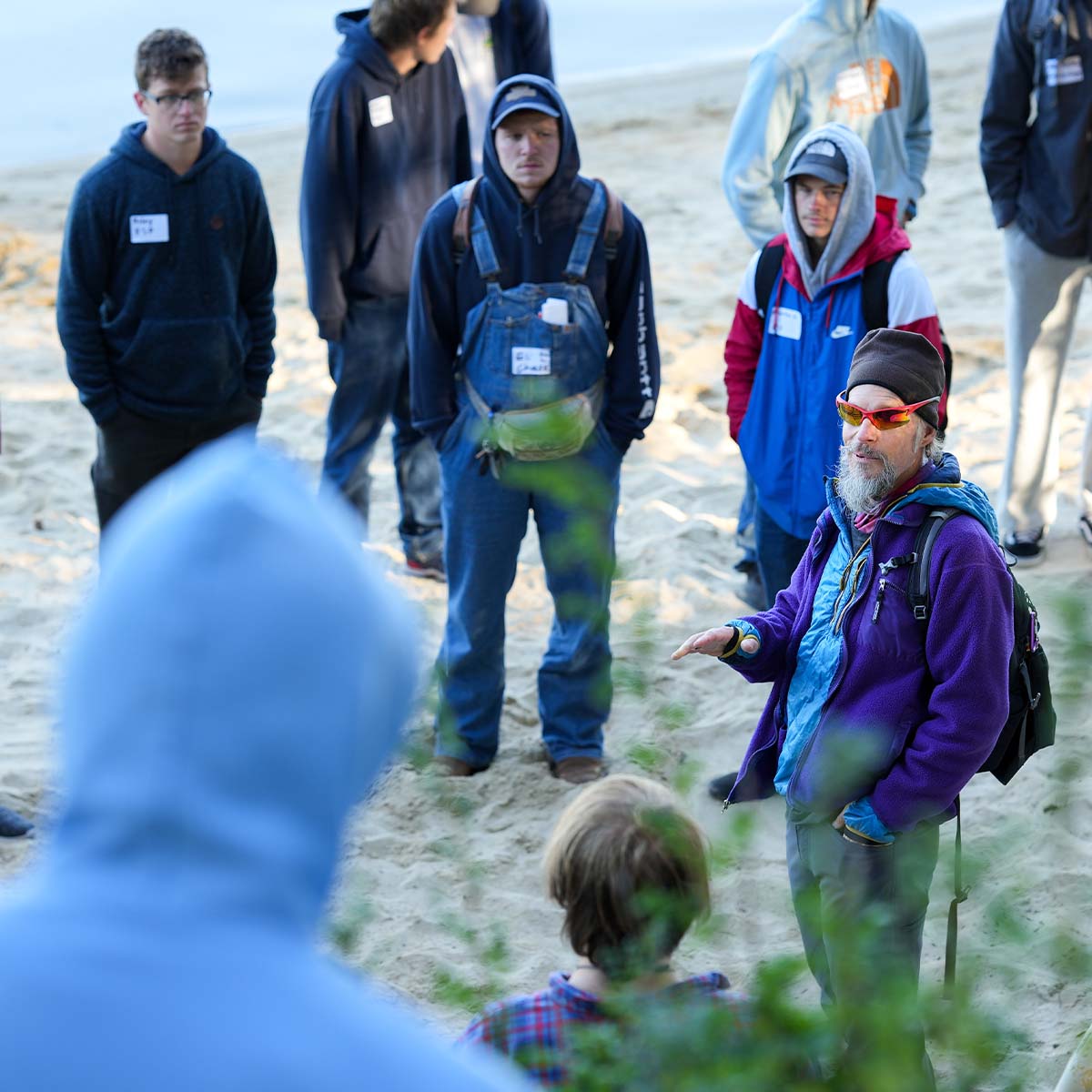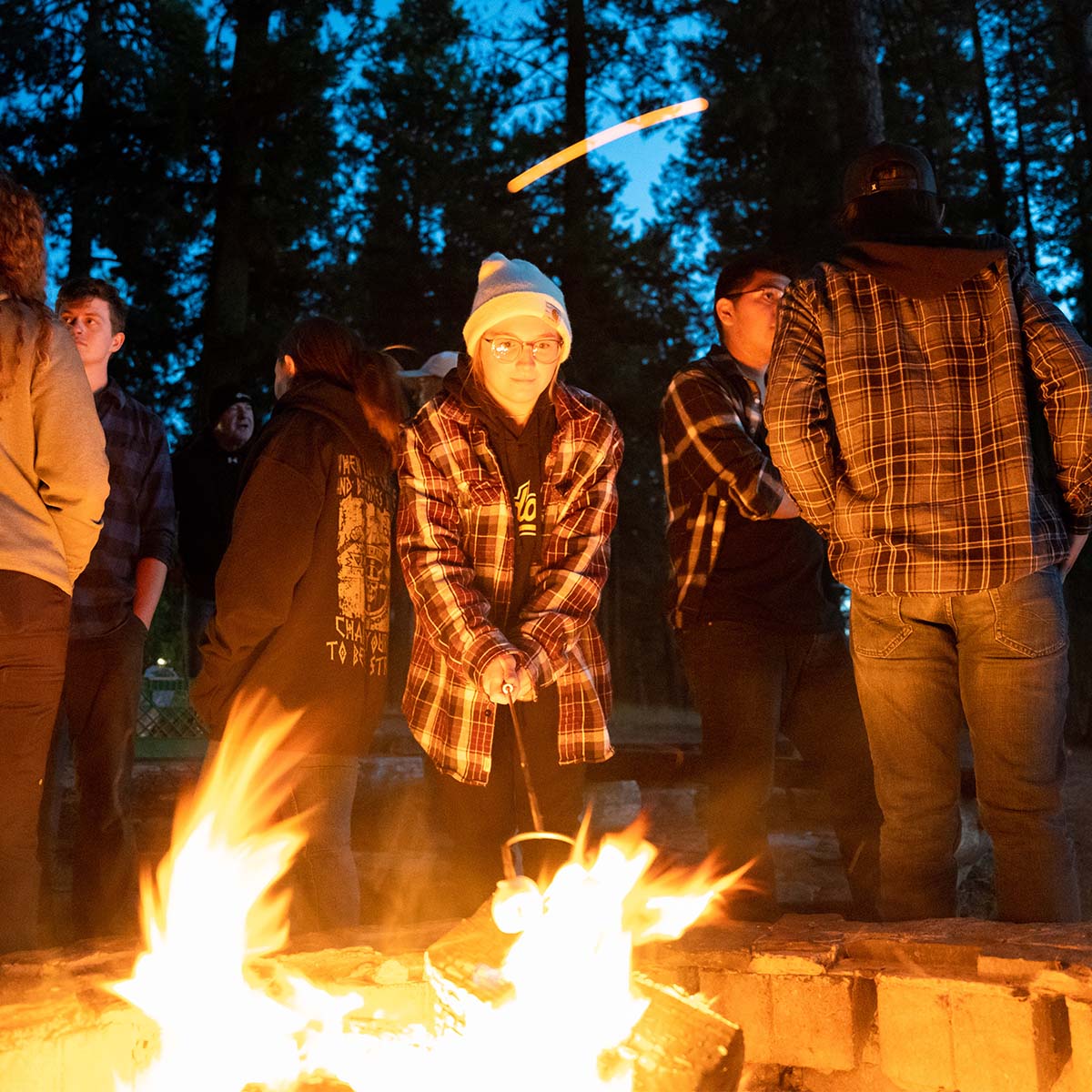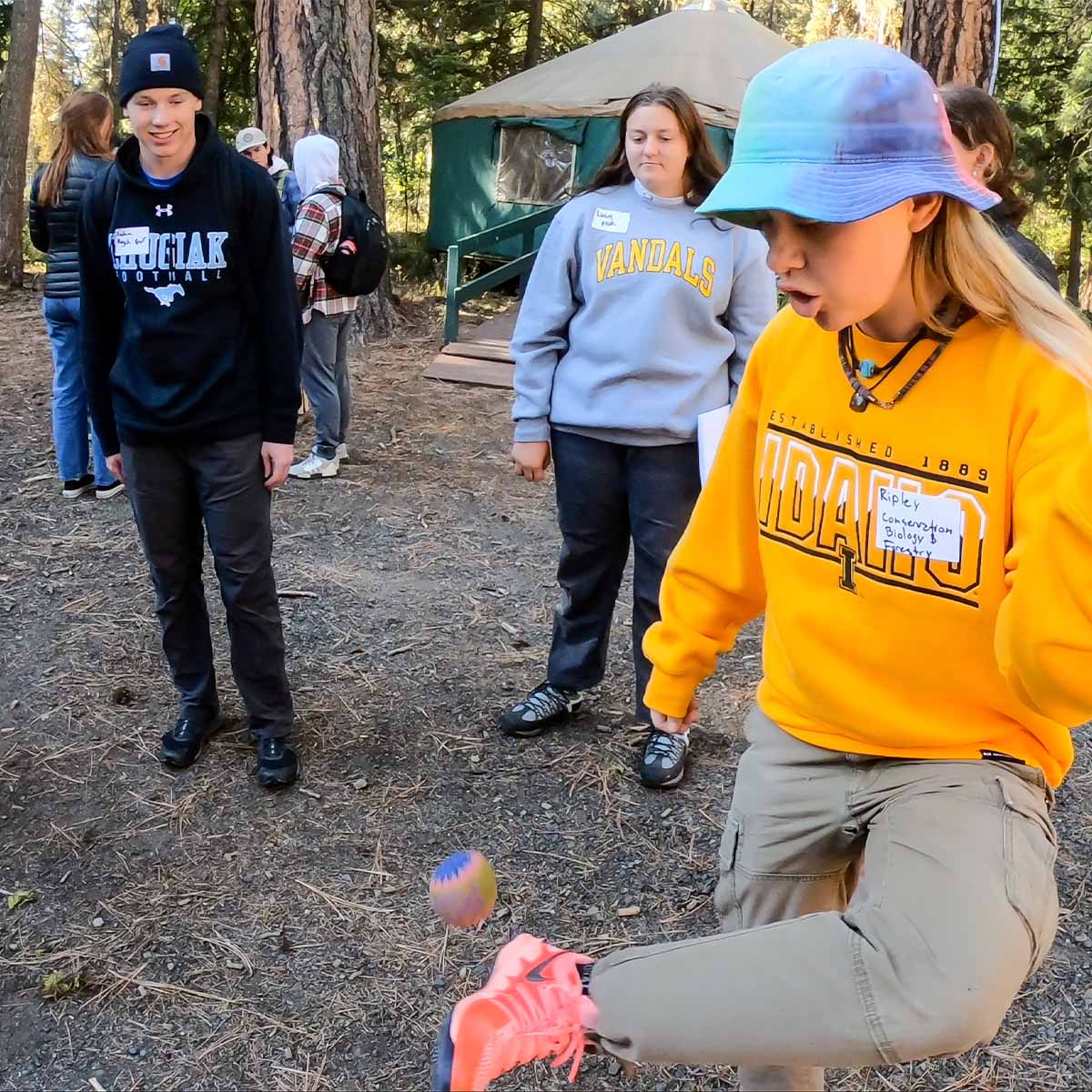Finding the Right Trail
CNR Students Use McCall Field Campus to Forge Futures and Friendships
With the sun setting through the trees and shining across Payette Lake, University of Idaho College of Natural Resources (CNR) Professor J.D. Wulfhorst and Lecturer Aaron Young started splitting wood for that night’s campfire.
Nearby, over 125 CNR students finished up dinner and began setting up tents or placing backpacks in their cabins. People who hardly knew each other before they left Moscow earlier in the day were now exploring U of I’s McCall Field Campus together.
It was obvious they weren’t here for just an ordinary lecture. This was a completely different vibe. Welcome to Natural Resources 101.
“The point of this trip is two-fold,” said Wulfhorst, professor of rural sociology and environmental science. “It’s about showing the students all of the different career paths they have in CNR and the experience of being here together. Being outside together at this beautiful campus is what they’ll remember.”
This annual trip, as part of the NR 101 course, started in 2015 and resumed this year after a two-year COVID-19-related hiatus. It gives students the opportunity to spend a weekend outdoors with fellow CNR classmates and faculty and helps them decide what they want to study during their time at U of I.
“A lot of these students don’t really know what they want to do yet, other than wanting to work outside or work with wildlife,” said Randall Brooks, extension professor of forestry in CNR. “After this trip, they can really visualize what a career in natural resources looks like and are ready to start finding their path.”

What happens when 125 students spend a weekend discovering natural resources majors at U of I's McCall Field Campus?
Forces of Change
Like many of her classmates, Josie MacConnell can’t stomach the idea of being in an office after she graduates.
“I’ve never wanted to be stuck behind a desk looking at paper all day,” said the freshman from Arco. “I need to be working outside.”
She is studying fire ecology management and hopes to one day become a medic on a wildland firefighting crew. She has already earned her EMT certification.
I don’t think we’re inheriting this land from our fathers and forefathers; I think we’re borrowing it from our children. I want to make it better for them.Josie MacConnell, CNR student
During the group activity Saturday morning, MacConnell and her classmates rotated through three learning sessions about the natural resources ecosystem: wildlife, wildfire, and human impacts on the environment.
Although the information she absorbed during the trip did not alter her intended career path, MacConnell discovered a new appreciation for how humans are affecting the environment and how the future of resource management should include caring for the planet.
“I don’t think we’re inheriting this land from our fathers and forefathers; I think we’re borrowing it from our children,” she said. “I want to make it better for them.”
Self-Restoration
When showing a group of students the possibilities of what they could study within CNR, the best way to do it is outside, where they can see everything they’ve been hearing about in the classroom.
“I love being outside and not being trapped inside four white walls,” said Sabrina Bales, a first-year transfer student from Austin, Texas. “It’s so much better to touch and experience things outside rather than just see the information on a whiteboard.”
Bales began her time at CNR studying conservation biology but said that while taking NR 101, and specifically after her experiences in McCall, she now wants to shift her focus to restoration ecology.
After participating in the session on human impacts on the environment, she realized that she and her classmates are positioned to make meaningful changes.
“I feel that I’ve personally taken quite a bit from the outdoors,” she said. “I want to focus on restoring the land and doing what I can do to give back.”

Building Connections
CNR faculty members understand that students bonding during the McCall trip are a key to them not only staying in the college, but also in succeeding.
“The relationships and connections they make here will guide them through their time at U of I,” said Heather Heward, CNR’s senior instructor in fire ecology and management.
Wade Haughton, a transfer student studying rangeland conservation, grew up in agriculture country. Originally from Moses Lake, Washington, he worked for people who raised corn and potatoes.
He always figured he would end up working in the agricultural industry and still believes it — even if he isn’t exactly sure what he wants to do yet.
He left McCall with an appreciation for coming together as a team and understanding the value of learning from not only professors, but from peers.
“I knew quite of bit of the information they spoke about during the sessions but I also saw people who knew a lot more about certain topics than I did,” he said. “Making friends and working together with the CNR group in McCall has been great.”
Managing Expectations
Brooks has been a fixture at every McCall field trip. As one of the NR 101 instructors, along with Wulfhorst, Young and Heward, he spent a large portion of his time floating in and out of each session, offering different viewpoints and asking students to challenge themselves and their teammates.
Although the students were able to enjoy some occasional down-time by playing hacky sack, exploring the campus or playing in the lake, Brooks was pleased as he watched them focus on the sessions and soak up all of the information presented to them, knowing how much of it will transform their experience at U of I.
One fact that resonated with them was that the world’s population is expected to reach eight billion people shortly, he said. With that many people competing for resources, Brooks knows the kind of hands-on education offered at CNR will help this group of future leaders make sound decisions.
“These students are the next generation of resource managers,” he said. “If we do our job correctly, they’ll leave U of I with the tools to be able to do it responsibly and sustainably.”

J.D. Wulfhorst, Ph.D.
Professor of Rural Sociology and Environmental Science
Heather Heward
Senior Fire Ecology & Management Instructor
Randall Brooks, Ph.D.
Extension Professor of Forestry and Extension Forestry Specialist
Article by David Jackson, University Communications and Marketing.
Photos by Garrett Britton, University of Idaho Visual Productions.
Published in November 2022.












